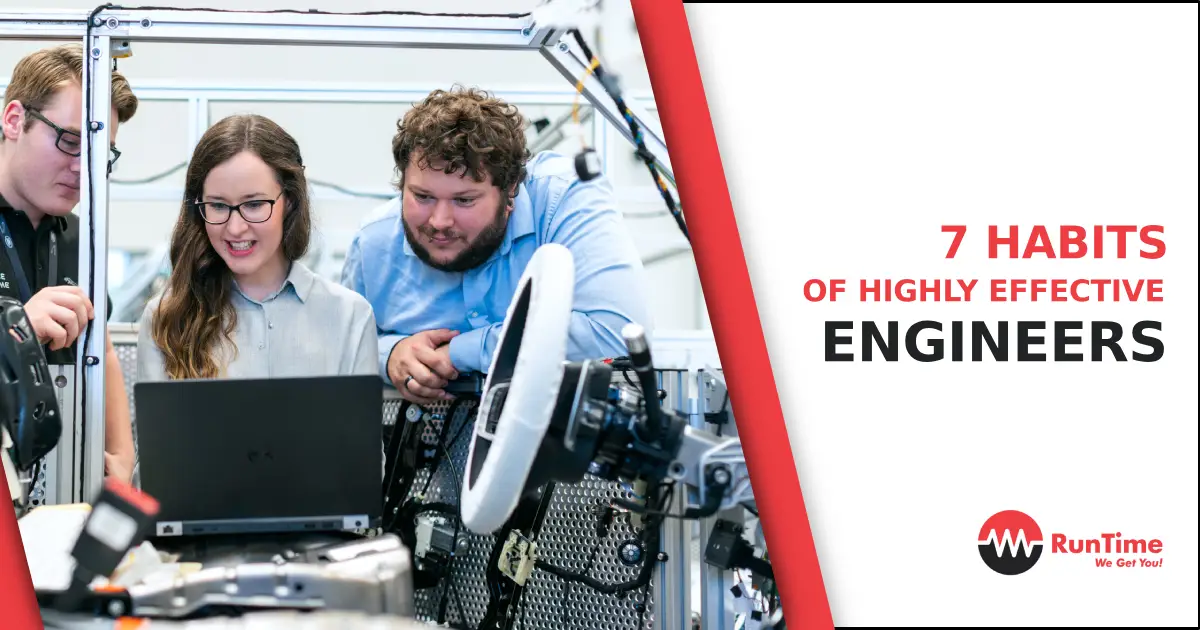Engineers play a crucial role in driving innovation and progress in today’s fast-changing world. Regardless of their area of expertise, be it electronic, software, mechanical, or any other discipline, certain habits can significantly impact an engineer’s effectiveness and success in their field. This article delves into the 7 habits of highly effective engineers, providing practical insights and guidance that can benefit engineers from all walks of life.
Continuous Learning and Adaptation
The field of engineering is constantly evolving with new technologies, tools, and methodologies emerging regularly. Highly effective engineers understand the importance of continuous learning and adaptation. They make it a habit to stay up-to-date with the latest industry trends and advancements. This can involve reading technical publications, attending conferences, taking courses, and participating in professional development activities. By remaining open to new ideas and being willing to adapt to change, these engineers remain at the forefront of their fields.
Examples:
- Software Engineers regularly update their skills in programming languages and frameworks to stay current with industry trends and adapt to the changing landscape of software development.
- An Electronic Engineer keeps up with advancements in semiconductor technology, attending conferences and reading research papers to adapt their designs for the most efficient and compact electronic components.
Systematic Problem Solving
Engineering is centered around problem-solving, and proficient engineers thrive in this domain. They tackle challenges systematically, by breaking them down into manageable components and applying a well-defined problem-solving process. This process typically involves defining the problem, generating potential solutions, analyzing the pros and cons of each solution, and implementing the best one. By following a structured approach, skilled engineers can proficiently and consistently solve intricate problems.
Examples:
- When facing a complex issue in the firmware of a medical device, a Firmware Engineer follows a systematic approach, thoroughly debugging the code, conducting comprehensive tests, and progressively narrowing down potential causes.
- Imagine a Mechanical Engineer working for an automotive company who is tasked with solving a complex issue in the suspension system of a new car model. The problem at hand is that the car’s suspension is causing excessive vibrations and instability when driving on uneven surfaces, leading to a subpar driving experience and potential safety concerns.
Strong Communication Skills
Engineering is rarely a solitary endeavor. Effective engineers understand the importance of strong communication skills. Whether working on a team project, presenting their ideas to stakeholders, or collaborating with colleagues, clear and concise communication is crucial. Highly effective engineers can explain technical concepts in a way that non-technical individuals can understand, facilitating better teamwork and ensuring that their ideas are well-received.
Examples:
- An Engineering Team Leader, regardless of their engineering background, communicates the project vision clearly to team members, using effective interpersonal skills to ensure that everyone understands their roles and responsibilities.
- A Quality Assurance Engineer communicates software defects and test results effectively to developers, facilitating clear and efficient bug fixes and software improvements.
Attention to Detail
In engineering, precision is paramount. Small errors can lead to significant problems and costly consequences. Highly effective engineers pay meticulous attention to detail in their work. They double-check their calculations, review their designs thoroughly, and ensure that all aspects of a project meet the required specifications. This attention to detail minimizes the risk of errors and sets a standard for quality work.
Examples:
- A Field Application Engineer (FAE) is responsible for providing technical support and guidance to customers implementing a complex integrated circuit (IC) into their electronic products. Attention to detail is paramount in this role, as even the smallest oversight can lead to compatibility issues, functionality problems, or product failures.
- An Avionics Engineer meticulously inspects aircraft control systems, ensuring that every component, sensor, and wire is in perfect working order, emphasizing precision to maintain flight safety.
Time Management and Prioritization
The demands of engineering projects can be overwhelming, and time management is crucial to success. Highly effective engineers are skilled at managing their time efficiently. They prioritize tasks, set clear goals, and create realistic schedules. By staying organized and focused, they can meet deadlines, reduce stress, and maintain a healthy work-life balance.
Examples:
- An Engineering Manager effectively allocates resources and sets project priorities, ensuring that tasks are completed on time and within budget to meet critical project milestones.
- An FPGA Engineer working on a telecommunications project ensures efficient time management by carefully planning and prioritizing tasks to meet tight production deadlines.
Embracing Collaboration
Collaboration is a cornerstone of engineering projects, often requiring interdisciplinary expertise. Effective engineers recognize the value of collaboration and actively seek input and insights from others. They appreciate diverse perspectives and work cohesively within teams. This habit not only leads to better outcomes but also fosters a positive working environment.
Examples:
- A Full-Stack Engineer collaborates with designers, front-end developers, and back-end developers to create a fully functional web application, emphasizing teamwork to deliver a seamless user experience.
- An IoT Engineer collaborates with data scientists and network engineers to create a comprehensive Internet of Things solution, combining expertise from multiple fields to develop a robust and integrated IoT ecosystem.
Ethical Integrity
Engineering has a profound impact on society and the environment. Highly effective engineers uphold ethical integrity as a core habit. They prioritize the safety and well-being of individuals and the environment in their work. They adhere to professional codes of ethics, maintain transparency, and ensure that their projects align with societal values and regulations.
Examples:
- An Electrical Engineer ensures that a power distribution system for a hospital complies with safety regulations, prioritizing ethical considerations to safeguard patient well-being.
- A Machine Learning Engineer maintains ethical integrity by adhering to strict data privacy regulations when developing machine learning models for healthcare applications, guaranteeing the security and confidentiality of patient data.
Conclusion
In conclusion, cultivating these seven habits is crucial for any engineer who wants to achieve excellence and make a positive impact on the world. By embracing these habits, you can become a highly effective engineer, advance your career, and contribute to the development of engineering as a whole. So, start working on these habits today and unleash your full potential as an engineer!
Make Your Dream Engineering Job a Reality with RunTime
At RunTime Recruitment, our team of expert engineers-turned-recruiters possess a deep understanding of technical recruiting within the engineering industry. We are committed to offering you valuable guidance and support throughout your job search journey, ensuring you find the perfect job that matches your skills and qualifications. So, if you’re a highly skilled engineer looking for new opportunities, we are here to help you.
Check out RunTime’s job portal to stay updated with the newest job openings in the engineering industry.









